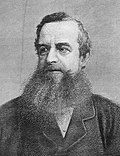| Calcutta International Exhibition | |
|---|---|
 Lord Ripon (who gave the opening address) in 1880 | |
| Overview | |
| BIE-class | Unrecognized exposition |
| Name | Calcutta International Exhibition |
| Area | 22 acres (8.9 ha) |
| Visitors | 1,000,000 (paid = 817,153) |
| Organized by | Augustus Rivers Thompson (president executive committee), S.T.Trevor (vice president) and Jules Joubert (general manager). |
| Participant(s) | |
| Countries | 37 |
| Location | |
| Country | British India |
| City | Calcutta |
| Venue | Grounds of the Indian Museum and the Maidan [1] |
| Coordinates | 22°33′29″N88°21′03″E / 22.55806°N 88.35083°E |
| Timeline | |
| Opening | 4 December 1883 |
| Closure | 10 March 1884 |
The Calcutta International Exhibition world's fair [2] was held in Calcutta (now Kolkata) from the end of 1883 to March 1884. [3]